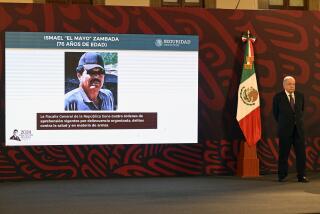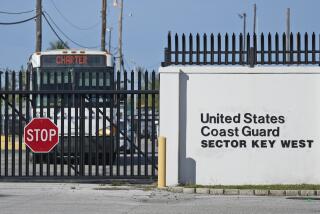Cuba, U.S. Join Forces to Catch Drug Suspects
- Share via
WASHINGTON — In a step that may signal a significant change in U.S. relations with the government of Fidel Castro, American authorities flew to Cuba on Saturday and took custody of two suspected cocaine smugglers who had been held for more than a month by Cuban officials.
The pair, both U.S. residents, were flown to Miami to face drug charges.
The operation represented the first time that the United States and Cuba have cooperated openly in such a case, suggesting that the Clinton Administration may be ready to widen its contacts with the Castro government, a Washington expert on U.S.-Cuban relations said.
Although the State Department sought to play down the significance of the cooperation between the two countries, Robert C. Bonner, head of the Drug Enforcement Administration, said in a statement that the case is “an important step forward in our bilateral counter-narcotics relationship.”
“(It) represents the first time Cuban authorities have returned a boat and its crew for prosecution on narcotics charges in the United States,” he said.
The case also represents a small triumph for the DEA, which is fighting a plan advanced by Vice President Al Gore to combine the anti-drug agency with the FBI--a plan that Bonner, who is about to leave office, has vehemently opposed.
The two suspects were identified by Cuban authorities as Jorge Roberto Lam Rojas, 33, and Jose Angel Clemente Alvarez, 31, DEA spokesman Jim Shedd said in Miami.
They were to appear before a federal magistrate Monday on charges of smuggling 720 pounds of cocaine aboard their speedboat, the Thief of Hearts.
Shedd said Rojas entered the United States during the Mariel boatlift of Cuban refugees in May, 1980, and Alvarez arrived in this country on June 3, 1991.
According to Shedd, the speedboat left the Bahamas on Aug. 14 and was spotted by U.S. agents on an anti-drug patrol aboard an Army helicopter.
A DEA videotape of the incident shows the speedboat’s hatch opening and bales of cocaine being dumped out as the boat veers into Cuban waters. The drugs eventually were recovered by U.S. authorities.
Using an emergency telex link, U.S. agents alerted the Cuban coast guard that the Thief of Hearts was on its way, and Cuban authorities seized the boat and crew on a nearby island.
Shedd said U.S. authorities first offered to turn over the evidence to the Cubans so that they could prosecute the case.
“But they in turn came back and said: ‘Look, we’re willing to give them up to you,’ ” Shedd said.
A State Department official said that the Cubans had made several similar offers during the George Bush Administration, which was said to have rejected the offers to avoid any contacts that would give legitimacy to the Castro government.
While State Department officials sought to play down any policy shift on the part of the Clinton Administration, Shedd insisted that a decision to cooperate with Cuba would be made only by the State Department and thus reflected a change in approach toward the island nation.
“We did not act unilaterally,” he said.
Outside of the government, the episode also was seen as a shift in policy.
Wayne S. Smith, who headed the U.S. government’s Cuban Interests Section during the Jimmy Carter Administration, said in an interview that “Cuba has been offering for some time to cooperate with the United States on interdiction of drug trafficking and turning over people they have apprehended. The United States has not responded.”
A shift, if indeed it occurred, would be significant and “would indicate a more pragmatic and sensible attitude on the part of the United States,” he said.
He said that when he escorted a delegation of retired U.S. military officers to Cuba in June, their Cuban military hosts recounted offers of cooperation and said that they had gotten no response from Washington.
Any change in the U.S. government’s approach to Cuba would be a risky political venture for the White House.
On Labor Day, when he visited southern Florida, home to the largest population of Cuban expatriates in the United States, President Clinton was adamant in his opposition to lifting the longstanding embargo on trade with Cuba.
Under Clinton, a number of small cooperative steps have occurred--among them a decision to expand the number of charter flights from Florida to Cuba in order to increase family contacts.
At the same time, Castro, whose nation is in economic straits, has been suggesting greater cooperation, relaxing the prohibition on the use of the U.S. dollar in Cuban commerce and calling in speeches for an easing of tensions with the United States.
More to Read
Sign up for Essential California
The most important California stories and recommendations in your inbox every morning.
You may occasionally receive promotional content from the Los Angeles Times.










